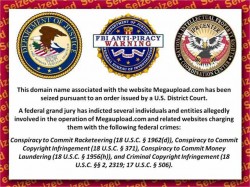Weekly News Roundup (22 January 2012)
Welcome to this Chinese New Year(‘s eve) edition of the Weekly News Roundup – the CNY(e) ed. of WNR, if you will. The alphabet soup continues, with more news on SOPA, PIPA, and a big one about MU, so with little time left in the year of the Rabbit, let’s get started.

In another week in which the copyright related headlines dominated the news, we start with reaction to last week’s White House statement on SOPA. The reaction from none other than media mogul Rupert Murdoch.
The controversial media owner wasn’t afraid to be controversial when it came to talking about the SOPA/PIPA controversy, accusing Obama of being beholden to his “Silicon Valley paymasters”, and calling Google a “piracy leader”. But for many, the fact that Murdoch is supporting SOPA/PIPA, is probably enough to push them to the other side of the debate.

Wikipedia, and thousands of other websites, blacked out their content for most of January 18 - a protest that got the attention of DC politicians
Which is probably why so many joined in on the January 18th day of action, which saw websites, including this one, black out their content to protest the votes on the controversial bills scheduled for 24 January. Even the newly obtained Righthaven.com, obtained via court appoint receiver auction last week, joined in the fun with a hilariously redacted letter to the MPAA (still not quite sure what the squid is all about). While thousands of websites joined in, the website that had the most influence on proceedings was probably Wikipedia. The website took the unprecedented step of blacking out all of their English language pages for 24 hours. When it was all over, and with everyone realising just how important Wikipedia has become in their lives, many also found out just exactly what SOPA was and what it could do. Some have criticized Wikipedia for participating in online activism, when the online encyclopaedia is supposed to be position neutral. This may be true, but when the very environment under which Wikipedia exists, and its own existence comes under threat, then there may be a need for a bit of activism. With people flooding elected official’s websites, emails, phone lines, calling on them to not support SOPA/PIPA, the power of the Internet was on full show.
And the protest seems to have had an almost instant effect, with key supporters of both SOPA and PIPA pulling out, and it became apparent pretty aoon that both bills were, in effect, dead in the water. With the 24 January deadline coming ever closer, the two sponsors of the bills, Rep Lamar Smith (R-Texas) and the senior senator for Vermont, Patrick Leahy, decided to postpone both bills, indefinitely. It was a political necessity, as they would say, for now at least. Chances are, the same bills with only minor changes, and very likely with different names, will be reintroduced at some later point when the heat dies down, but for now, this was still a major political victory for the Internet. The tech sector, who have largely stayed out of the political arena, may have also realised the power of lobbying – whether this is a good thing or a bad thing, that remains to be seen. It’s an unfortunate reality in today’s political environment that political lobbying is so effective, but for too long, politicians have only been hearing one side of the story, and perhaps this will help even things up a bit.
Of course, the MPAA was fairly incensed at both the blackout, and the fact that their bill, and I’m using “their” correctly and intentionally, was sunk. Chris Dodd, who has had a difficult learning period as the new Chairman of the MPAA, came out attacking the blackout as a “dangerous gimmick … designed to punish elected and administration officials who are working diligently to protect American jobs from foreign criminals”, obvious inferring that politicians against SOPA/PIPA are negligent in their duties in stopping criminals, and playing to the xenophobic crowd, added the quantifier “foreign” just in case. Dodd also attacked the decision to pull the bills, again using all the right keywords, describing the entire Internet as a “safe haven for foreign thieves”. And showing his experience as a Washington player, Dodd warned his former colleagues not to “ask me to write a check for you when you think your job is at risk”, demonstrating in one sentence the undue influence of money in US politics, and the entertainment lobby’s masterful manipulation of democracy through it.

MegaUpload's domain has been seized on order of Federal prosecutors, who say the website engaged in racketeering and money laundering
But before the champagne bottles had emptied, an even bigger story broke, as it was revealed that Megaupload, one of the web’s largest properties, had been shut down. In a simultaneous, multi-national, law enforcement action, involving FBI agents in the US, and law enforcement in the Netherlands, Canada and New Zealand, servers were seized, offices raided, an the founder of Megaupload and some of his employees were also arrested. In the court documents filed so far, incriminating emails (that were obtained, somehow) showed that the people running Megaupload were well aware of the nature of their service, in that it was being used by pirates, and sought to continue to profit from the activities. But then, only an idiot, or maybe a DC politician, won’t have known what Megaupload was all about just by searching for a few MU links on Google.
I’ve not had a look at all the emails, only some of the more serious ones being posted here and there, but to me, this whole MU case strikes me as a civil matter, not a criminal one. For example, what makes MU different enough to the ongoing MPAA vs Hotfile trial – if anything, Hotfile appears to be even more “guilty”, as they were paying pirates directly based on the popularity of their uploads. And as for incriminating emails, we’ve seen it all before in the Viacom vs YouTube case – despite the existence of these so called “smoking gun” evidence, as Viacom liked to call them, Google/YouTube eventually won the case on DMCA Safe Harbor grounds. So for those that are saying the government’s case against MU is rock solid, I think it might be a bit too early to judge, as the legal documents revealed at this stage only shows one side of the story, the government’s side. When MU provides their version of events, things might no longer be as black and white, and their lawyers might just cloud the issue enough to make the most serious criminal charges (like the racketeering and money laundering charges) go away.
And their version of events might just include testimony from the many that used MU’s service legitimately, and most are pretty angry at the excessive amount of force and haste the government seems to have used in taking down MU. You cannot deny that MU had substantial non-infringing uses, and that could provide MU protection under the Betamax verdict, but it all depends if the infringing aspects are enough to negate MU’s legitimate uses, and how complicit the owners and operators of MU were.
I also think part of the strategy here is to scare the rest of the online storage industry into taking copyright enforcement more seriously, even if the government doesn’t ultimately win the case against MU. With SOPA/PIPA on hold for now, online storage services will need to take a good look at the DMCA, and make sure their compliance is genuine. That should be enough to keep the FBI away, for now, while most likely, tons of pirated content would still exist on these sites.
So a lot happening, and perhaps too much to digest in such a short period, but I’m sure both SOPA/PIPA, and MU, will be occupying the headlines for a while yet.
And on that note, we come to the end of this rather short WNR. Nothing left to say except, Xin Nian Kuai Le, Gong Xi Fa Cai (Happy New Year , Congratulations and be prosperous).
